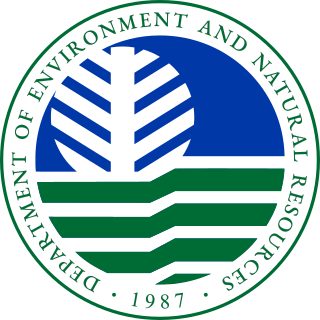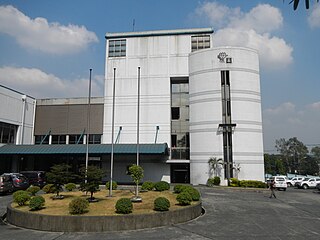
The Philippine Atmospheric, Geophysical and Astronomical Services Administration is the National Meteorological and Hydrological Services (NMHS) agency of the Philippines mandated to provide protection against natural calamities and to insure the safety, well-being and economic security of all the people, and for the promotion of national progress by undertaking scientific and technological services in meteorology, hydrology, climatology, astronomy and other geophysical sciences. Created on December 8, 1972, by reorganizing the Weather Bureau, PAGASA now serves as one of the Scientific and Technological Services Institutes of the Department of Science and Technology.

The National Police Commission is an agency attached to the Department of the Interior and Local Government (DILG) responsible for the administration and control of the Philippine National Police (PNP). It has the authority to administer police entrance examination, to investigate police anomalies and irregularities, and to summarily dismiss erring police officers.

The Department of Environment and Natural Resources is the executive department of the Philippine government responsible for governing and supervising the exploration, development, utilization, and conservation of the country's natural resources.

The Department of Budget and Management is an executive body under the Office of the President of the Philippines. It is responsible for the sound and efficient use of government resources for national development and also as an instrument for the meeting of national socio-economic and political development goals.

The Department of Energy is the executive department of the Philippine government responsible for preparing, integrating, manipulating, organizing, coordinating, supervising, and controlling all plans, programs, projects and activities of the Government relative to energy exploration, development, utilization, distribution and conservation.

The Department of Science and Technology, is the executive department of the Philippine government responsible for the coordination of science and technology-related projects in the Philippines and to formulate policies and projects in the fields of science and technology in support of national development.

The Department of Tourism is the executive department of the Philippine government responsible for the regulation of the Philippine tourism industry and the promotion of the Philippines as a tourist destination.
The Philippines' Presidential Management Staff is an agency attached to Malacañang that is tasked to manage the development and formulation of the projects and policies of the Office of the President. Though the PMS is headed by a Secretary, the Secretaries of the Cabinet, Chief of Staff, and Appointments, support the agency. The PMS, the Office of the Appointments Secretary and the newly created Events Management Cluster are under the supervision of the Office of the Special Assistant to the President.

The National Economic and Development Authority is an independent cabinet-level agency of the Philippine government responsible for economic development and planning. It is headed by the president of the Philippines as chairman of the NEDA board, with the Secretary of Socioeconomic Planning as vice-chairman. A number of Cabinet members, the Governor of the Bangko Sentral ng Pilipinas, the Chairperson of the Metropolitan Manila Development Authority, the Chief Minister of Bangsamoro, the Secretary of Information and Communications Technology, the Chairman of the Subic–Clark Area Development Corporation, and the National President of the Union of Local Authorities of the Philippines are members of the NEDA Board.

The Philippines' Bureau of Fisheries and Aquatic Resources, is an agency of the Philippine government under the Department of Agriculture responsible for the development, improvement, law enforcement, management and conservation of the Philippines' fisheries and aquatic resources.

The Philippines' Bureau of Soils and Water Management, is an agency of the Philippine government under the Department of Agriculture responsible for advising and rendering assistance on matters relative to the utilization of soils and water as vital agricultural resources.

The Maritime Industry Authority, known by the acronym MARINA, is an agency of the Philippine government under the Department of Transportation responsible for integrating the development, promotion and regulation of the maritime industry in the Philippines.

The Laguna Lake Development Authority (LLDA), one of the attached agencies of the Department of Environment and Natural Resources (DENR), is responsible for the preservation, development, and sustainability of Laguna de Bay and its 21 major tributary rivers.
The Water Resources Development Act of 1986 is part of Pub. L. 99–662, a series of acts enacted by Congress of the United States on November 17, 1986.

The Philippine Commission on Women, is a government agency run by the government of the Philippines with the intention of promoting and protecting the rights of the Women in the Philippines. It was established on January 7, 1975, through Presidential Decree No. 633.
The Philippines' water supply system dates back to 1946, after the country declared independence. Government agencies, local institutions, non-government organizations, and other corporations are primarily in charge of the operation and administration of water supply and sanitation in the country.

The Alberta Energy Regulator (AER) is an Alberta corporation, with its main office in Calgary, Alberta. The AER's mandate under the Responsible Energy Development Act (REDA), passed on 10 December 2012 and proclaimed on 17 June 2013, is to provide safe, efficient, orderly, and environmentally responsible development of energy resources in the province. Under the REDA, the Alberta Government established the AER in December 2012 to provide a one-stop shop for regulatory approvals after industry complained about the delays and costs of red tape. The legislation combined duties of the Energy Resources Conservation Board with responsibilities of Alberta Environment and Sustainable Resource Development to create a single entity to administer the Public Lands Act, the Environmental Protection and Enhancement Act and the Water Act. The AER operates at arm's length from the Government of Alberta, under an appointed board of directors headed by Chair David Goldie. On 17 June 2013, all regulatory functions previously carried out by the Energy Resources Conservation Board were taken over by the AER.
The Colorado Water Conservation Board (CWCB) operates as a division of the Colorado Department of Natural Resources. The Colorado legislature founded the Colorado Water Conservation Board (CWCB) through the passage of House Bill no. 6 in 1937 for the "purpose of aiding in the protection and development of the waters of the state". The bill decreed that the agency would be run by twelve directors, who convened for the first time on July 13, 1937.

The Directorate General of Marine and Fisheries Resources Surveillance is a government agency under the management of the Ministry of Marine Affairs and Fisheries of Indonesia. Formally established on 23 November 2000 according to Presidential Decree No. 165/2000, the PSDKP is the agency responsible for supervising the marine and fishery resources of the Republic of Indonesia. The main mission of PSDKP is the prevention of Illegal, unreported and unregulated fishing in Indonesian waters, which has caused a substantial loss for Indonesia's fishing industry. In its mission to prevent illegal fishing, PSDKP has conducted joint-operations with the Indonesian Navy, Water Police, Sea and Coast Guard, the Maritime Security Agency and Customs. PSDKP is however is not associated with these agencies.

The Ministry of Ecology, Geology and Natural Resources is a central executive body of the Government of Kazakhstan, providing leadership in the areas of formation and implementation of state policy, coordination of management processes in the areas of environmental protection, development of the green economy, waste management, protection, control and supervision the rational use of natural resources, the state geological study of the subsoil, the reproduction of the mineral resource base, the use and protection of the water fund, in water supplies, sanitation, forestry, protection, reproduction and use of wildlife and the specially protected areas.
















